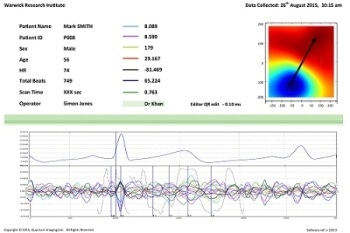Mar 8 2016
Quantum Imaging, a spinout from Leeds University, is working on a portable device dubbed Quantum Vitalscan that warrants a closer look in this week’s editorial.
 Data generated by Quantum Vitalscan. Image courtesy: Quantum Imaging.
Data generated by Quantum Vitalscan. Image courtesy: Quantum Imaging.
Quantum Vitalscan enables medical professionals to triage patients suffering from chest pains by scanning the heart without the need for invasive procedures.
The company recently secured £4.6m ($6.4m) in a series A round, as reported by GUV, from Leeds University and IP Group, a UK-based research commercialisation firm that has partnerships with several UK universities and focuses on the biotech, healthcare, cleantech and technology sectors. Members of the spinout’s management team and other unnamed investors also joined the round.
Quantum Imaging’s technology was developed by the Quantum Information group, led by quantum information science professor Ben Varcoe in Leeds University’s School of Physics and Astronomy.
The company claims that 5% – approximately 23 million – of emergency hospital visits in the UK are due to heart disease. Although staff presume all patients claiming chest pains are suffering a heart attack, between 2% and 8% of them are not properly diagnosed and discharged despite indeed having had a heart attack.
Currently, hospitals rely on a series of tests to determine a patient’s condition, including an electrocardiogram and the measurement of a protein, troponin, in blood tests. Troponin levels increase following damage to the heart muscle. However, it may be up to 12 hours later before it can be detected – during which time the patient's condition may deteriorate.
Similarly, approximately 75% of patients who go to the hospital with chest pains are not at risk from a hear attack but still undergo the entire triage process – at a cost to the hospital of up to £2,000 per patient.
Quantum Vitalscan is a battery-powered, portable device able to scan a patient’s heart in three to five minutes – a fraction of the time it takes traditional methods. The device uses a non-invasive sensor that can scan through clothing and can be used with minimal training. It produces numerical data, a trace and a visual magnetic field map generated by the electrical activity of a beating heart to help staff determine whether a patient is suffering from cardiac disease.
The device initially relied on technology called superconducting quantum interference devices (Squids). A major weakness of Squids, however, is that it can be used only in a shielded room, pushing the research team to advance its device further.
The initial development of the device was funded by the National Innovation Centre, an investment arm of the UK’s National Health Service, Medical Technologies Innovation and Knowledge Centre – a research centre at Leeds University – and supported by the Engineering and Physical Sciences Research Council, Biotechnology and Biological Sciences Research Council and the UK’s innovation agency Technology Strategy Board, now Innovate UK.
In 2014, IP Group led a £1.6m seed round that included Leeds University and IP Venture Fund II, a £30m venture capital fund backed by IP Group and the European Investment Fund, the VC unit of the EU’s European Investment Bank.
Quantum Imaging has conducted two clinical studies to date and will use the latest cash injection to support commercialisation of its device.
Steve Parker, chief executive of Quantum Imaging, said: “The timing and size of this investment is important to the company as it allows us to fully commit to an aggressive product and platform development and clinical research strategy whilst building a high-quality team and facilities.”